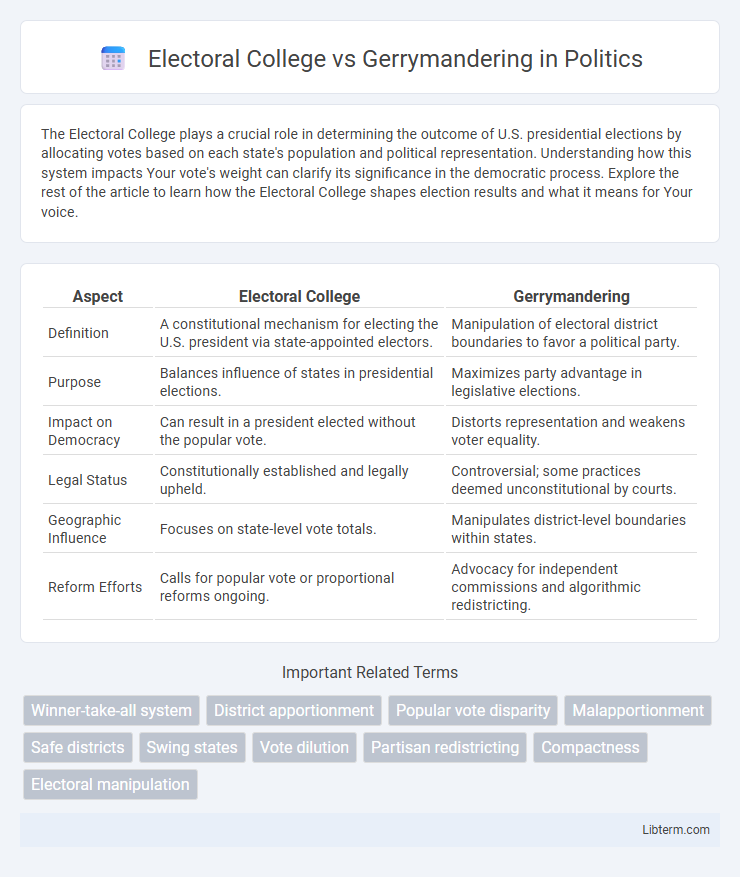The Electoral College plays a crucial role in determining the outcome of U.S. presidential elections by allocating votes based on each state's population and political representation. Understanding how this system impacts Your vote's weight can clarify its significance in the democratic process. Explore the rest of the article to learn how the Electoral College shapes election results and what it means for Your voice.
Table of Comparison
| Aspect | Electoral College | Gerrymandering |
|---|---|---|
| Definition | A constitutional mechanism for electing the U.S. president via state-appointed electors. | Manipulation of electoral district boundaries to favor a political party. |
| Purpose | Balances influence of states in presidential elections. | Maximizes party advantage in legislative elections. |
| Impact on Democracy | Can result in a president elected without the popular vote. | Distorts representation and weakens voter equality. |
| Legal Status | Constitutionally established and legally upheld. | Controversial; some practices deemed unconstitutional by courts. |
| Geographic Influence | Focuses on state-level vote totals. | Manipulates district-level boundaries within states. |
| Reform Efforts | Calls for popular vote or proportional reforms ongoing. | Advocacy for independent commissions and algorithmic redistricting. |
Understanding the Electoral College System
The Electoral College system allocates 538 electoral votes across U.S. states based on congressional representation, emphasizing a winner-take-all approach in most states. Unlike gerrymandering, which manipulates district boundaries to influence House elections, the Electoral College shapes presidential outcomes through state-level vote aggregation rather than district-level control. Understanding this distinction is crucial for analyzing how electoral mechanisms impact political representation and election results.
What Is Gerrymandering?
Gerrymandering is the manipulation of electoral district boundaries to favor a specific political party or group, often resulting in skewed election outcomes. This practice involves "cracking" opponents' voters across many districts or "packing" them into a few, diminishing their electoral influence. Unlike the Electoral College system, which allocates votes based on state populations during presidential elections, gerrymandering directly alters the balance of power in legislative districts.
Historical Origins: Electoral College and Gerrymandering
The Electoral College was established in 1787 during the Constitutional Convention as a compromise between election of the president by Congress and popular vote, designed to balance influence between populous and smaller states. Gerrymandering originated in 1812 when Massachusetts Governor Elbridge Gerry signed a bill redistricting the state to benefit his party, creating a district shape that resembled a salamander. Both systems historically emerged from political negotiations aimed at consolidating power and managing representation, reflecting enduring challenges in democratic governance.
How the Electoral College Influences Election Outcomes
The Electoral College influences election outcomes by allocating a predetermined number of electors to each state, which often magnifies the impact of swing states and diminishes the influence of smaller or heavily partisan states. This system can result in a candidate winning the presidency without securing the popular vote, as seen in elections like 2000 and 2016. Unlike gerrymandering, which manipulates district boundaries to affect local voting power, the Electoral College shapes overall presidential election strategy by encouraging candidates to focus on states with the most electoral votes.
The Role of Gerrymandering in Shaping Districts
Gerrymandering plays a critical role in shaping electoral districts by manipulating boundaries to favor a particular political party, often undermining fair representation. This practice distorts voter distribution and can significantly influence outcomes in the Electoral College by securing more indirect votes through strategically engineered congressional districts. The manipulation of district lines compromises the principle of equal representation, impacting the balance of political power at both state and national levels.
Comparing Their Impact on Voter Representation
The Electoral College and gerrymandering both significantly influence voter representation but operate through different mechanisms. The Electoral College can disproportionately amplify the voices of swing states while diminishing votes in heavily partisan regions, whereas gerrymandering manipulates district boundaries to create safe seats for a particular party, often diluting the voting power of minority groups. Both systems contribute to unequal representation, undermining the principle of one-person, one-vote by skewing electoral outcomes.
Electoral College vs Gerrymandering: Advantages and Criticisms
The Electoral College ensures a federal structure by giving states proportional influence in presidential elections, promoting national unity and preventing dominance by populous regions. Critics argue it can distort voter representation, leading to outcomes misaligned with the national popular vote, while Gerrymandering manipulates district boundaries to favor political parties, undermining fair representation. Gerrymandering's advantage lies in enabling targeted political strategies, but it faces criticism for entrenching incumbents and reducing electoral competitiveness.
Reform Proposals for a Fairer Electoral Process
Reform proposals for a fairer electoral process include abolishing the Electoral College in favor of a national popular vote to ensure every vote carries equal weight. Redistricting reform advocates recommend independent commissions to prevent gerrymandering and create more competitive districts reflecting genuine voter demographics. Implementing these changes aims to enhance democratic representation and reduce partisan manipulation in U.S. elections.
Notable Cases and Controversies in U.S. Elections
The Electoral College has faced scrutiny in notable cases such as the 2000 Bush v. Gore election, where the Supreme Court decision effectively determined the presidency amid contested Florida votes. Gerrymandering controversies prominently surfaced in cases like Rucho v. Common Cause (2019), in which the Supreme Court ruled that partisan gerrymandering claims present political questions beyond federal courts' reach. Both mechanisms have fueled debates over electoral fairness, raising questions about representation and the balance of political power in U.S. elections.
Future Implications for American Democracy
The Electoral College and gerrymandering both shape the democratic process by influencing electoral outcomes and voter representation in distinct ways. The persistence of the Electoral College may continue to skew presidential elections toward less populous states, raising concerns about equal representation, while gerrymandering manipulates district boundaries to entrench partisan advantages, undermining electoral competitiveness. Future reforms targeting these mechanisms could enhance democratic fairness by ensuring more proportional representation and preserving the principle of one person, one vote.
Electoral College Infographic

 libterm.com
libterm.com